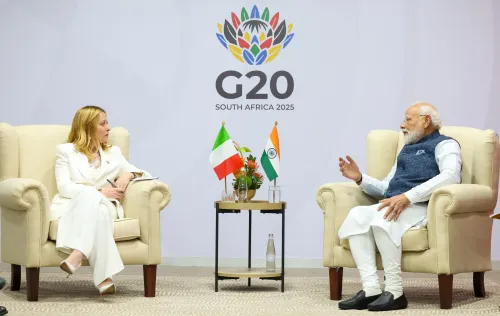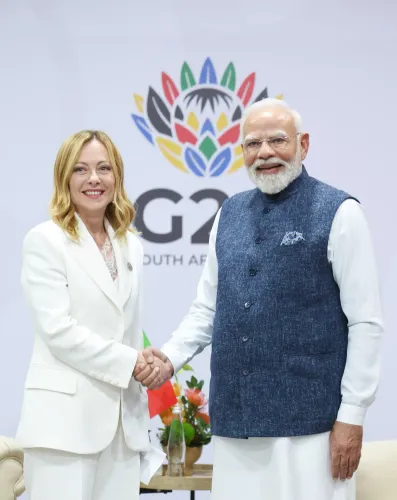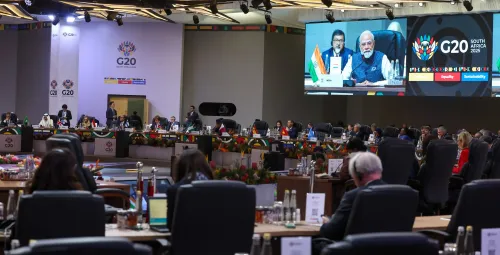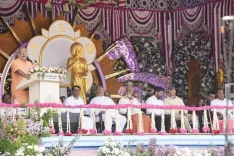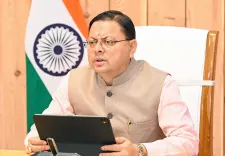Will South Korean President Lee Respect North Korea's Political System?
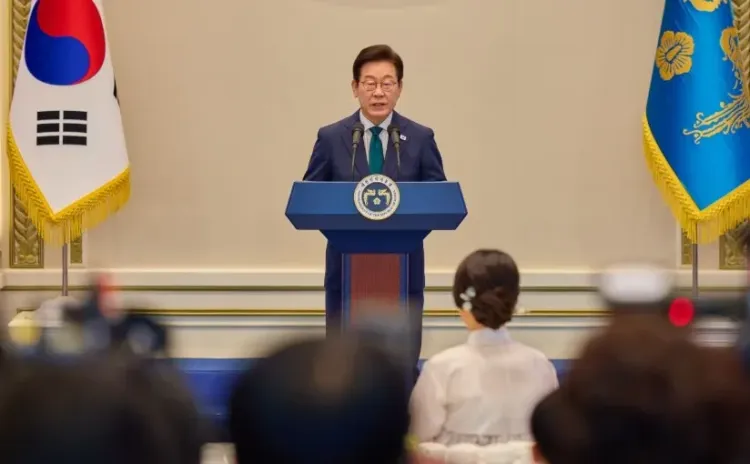
Synopsis
Key Takeaways
- Commitment to Respect: President Lee emphasizes respect for North Korea's political system.
- No Absorption Plan: Lee assures there will be no unification by absorption.
- Reviving Military Pact: Focus on restoring the 2018 military agreement to reduce tensions.
- Denuclearization Goal: Lee stresses the importance of a nuclear-free Korean Peninsula.
- Shuttle Diplomacy with Japan: Committed to forward-looking cooperation with Japan.
Seoul, Aug 15 (NationPress) South Korean President Lee Jae Myung announced on Friday his commitment to honor North Korea's political framework, stating he would not seek unification through absorption. He also promised to take actions aimed at reviving the 2018 inter-Korean military agreement to alleviate tensions.
Lee's remarks came during a speech commemorating the 80th anniversary of the liberation of the Korean Peninsula from Japan's colonial rule from 1910 to 1945, just a day after North Korean leader Kim Jong-un's sister, Kim Yo-jong, dismissed a recent conciliatory proposal from Lee's administration as a mere “pipe dream.”
In his Liberation Day address, Lee extended a hand to North Korea and presented his vision for denuclearization on the Korean Peninsula, as reported by the Yonhap News Agency.
“We affirm our respect for the North's current system, assure that we will not pursue any form of unification by absorption, and emphasize that we have no intention of engaging in hostile acts,” Lee stated during a ceremony at the Sejong Center for Performing Arts.
To diminish the risk of unintended confrontations between the two Koreas and foster military trust, Lee expressed that South Korea would implement “proactive, gradual steps” to reinstate the 2018 military agreement aimed at reducing tensions.
However, Lee stressed that achieving North Korea's denuclearization is essential for a peaceful Korean Peninsula.
“A peaceful Korean Peninsula must be free of nuclear weapons and rooted in cooperative relationships with neighboring nations,” he noted.
Reviving the military pact, which was halted during the tenure of conservative President Yoon Suk Yeol, was among Lee's campaign promises.
Since assuming office in June, Lee has directed the military to cease propaganda broadcasts along the border and has encouraged activists to stop sending balloons across the border, marking the first tangible steps towards improving inter-Korean relations.
The South Korean military stated that the North halted its broadcasts following Seoul's actions, although Kim Yo-jong refuted claims that North Korea was dismantling its propaganda loudspeakers.
Lee emphasized the necessity of rebuilding trust to pave the way for dialogue, expressing hopes that Pyongyang will reciprocate Seoul's initiatives.
“More crucial than winning a fight, and more important than winning without a fight, is establishing a state where fighting is unnecessary—that is, creating peace,” he remarked.
Regarding Japan, Lee committed to pursuing “forward-looking, mutually beneficial cooperation” through active “shuttle diplomacy.” He is scheduled to visit Tokyo for summit talks with Japanese Prime Minister Shigeru Ishiba later this month, just before a planned meeting with US President Donald Trump.
“Guided by the principle of pragmatic, national interest-focused diplomacy, we will seek forward-looking, mutually beneficial cooperation with Japan while holding frequent meetings and candid dialogues through shuttle diplomacy,” Lee stated.
Also commemorating the 60th anniversary of normalized diplomatic relations, Lee asserted that Seoul and Tokyo should confront their painful histories and redefine bilateral ties to progress, referring to Japan as “a neighbor across the sea” and “an indispensable partner” in economic development.
“I hope the Japanese government will courageously address our painful history and work to maintain trust between our two nations,” he added.
Lee's upcoming two-day visit to Japan on August 23-24 will serve as an opportunity to strengthen personal relations with Ishiba and discuss enhancing trilateral cooperation with the United States, alongside matters of regional peace and stability, according to the presidential office.
Prior to his anticipated visit to the US, Lee pledged to address challenges stemming from evolving economic and security landscapes and to capitalize on new opportunities in advanced technologies, including semiconductors and artificial intelligence.
“The ongoing Korea-US tariff negotiations are merely one wave in this storm. More waves will follow swiftly in the coming months,” he remarked. “It is entirely up to us to determine whether we are swept away by towering waves and face shipwreck, or if we can turn this crisis into an opportunity and move forward.”
Lee's forthcoming summit with Trump is anticipated to cover alliance security matters, as well as industrial cooperation in the semiconductor, battery, and shipbuilding sectors, based on the trade agreement the two nations reached earlier this month, according to the presidential office.


